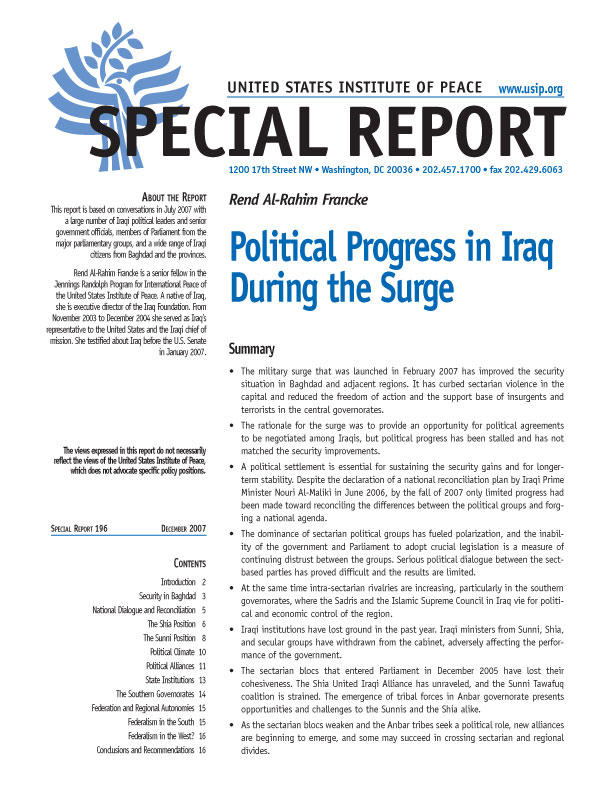Rend Al-Rahim Francke concludes that the military surge has bettered the security situation in Baghdad. However, political progress has faltered and not matched these improvements.

Summary
- The military surge that was launched in February 2007 has improved the security situation in Baghdad and adjacent regions. It has curbed sectarian violence in the capital and reduced the freedom of action and the support base of insurgents and terrorists in the central governorates.
- The rationale for the surge was to provide an opportunity for political agreements to be negotiated among Iraqis, but political progress has been stalled and has not matched the security improvements.
- A political settlement is essential for sustaining the security gains and for longer-term stability. Despite the declaration of a national reconciliation plan by Iraqi Prime Minister Nouri Al-Maliki in June 2006, by the fall of 2007 only limited progress had been made toward reconciling the differences between the political groups and forging a national agenda.
- The dominance of sectarian political groups has fueled polarization, and the inability of the government and Parliament to adopt crucial legislation is a measure of continuing distrust between the groups. Serious political dialogue between the sect-based parties has proved difficult and the results are limited.
- At the same time intra-sectarian rivalries are increasing, particularly in the southern governorates, where the Sadris and the Islamic Supreme Council in Iraq vie for political and economic control of the region.
- Iraqi institutions have lost ground in the past year. Iraqi ministers from Sunni, Shia, and secular groups have withdrawn from the cabinet, adversely affecting the performance of the government.
- The sectarian blocs that entered Parliament in December 2005 have lost their cohesiveness. The Shia United Iraqi Alliance has unraveled, and the Sunni Tawafuq coalition is strained. The emergence of tribal forces in Anbar governorate presents opportunities and challenges to the Sunnis and the Shia alike.
- As the sectarian blocs weaken and the Anbar tribes seek a political role, new alliances are beginning to emerge, and some may succeed in crossing sectarian and regional divides.
- The debate in Washington has been restricted to the level and duration of U.S. troop presence in Iraq. In the coming months, the debate should turn to means of supporting the political process and strengthening governance in Iraq as a path to stability.
- Bottom-up approaches to reconciliation and accommodation do not obviate the need for a broader political settlement. The United States should support a sustained international mediation effort led by the UN Security Council resulting in an Iraqi compact endorsed by Iraq’s neighbors and the international community.
- Iraqi efforts to develop cross-sectarian political alliances and national platforms need to be encouraged. The incorporation of the Anbar tribes into national politics is important to sustaining security gains.
- A competent national government in Baghdad is essential to the long-term stability of Iraq. A weak government will be unable to ensure the internal and external security of the country or manage revenues. More effort and resources are needed to strengthen the competence and effectiveness of the Iraqi government.
About the Report
This report is based on conversations in July 2007 with a large number of Iraqi political leaders and senior government officials, members of Parliament from the major parliamentary groups, and a wide range of Iraqi citizens from Baghdad and the provinces.
Rend Al-Rahim Francke is a senior fellow in the Jennings Randolph Program for International Peace of the United States Institute of Peace. A native of Iraq, she is executive director of the Iraq Foundation. From November 2003 to December 2004 she served as Iraq’s representative to the United States and the Iraqi chief of mission. She testified about Iraq before the U.S. Senate in January 2007.